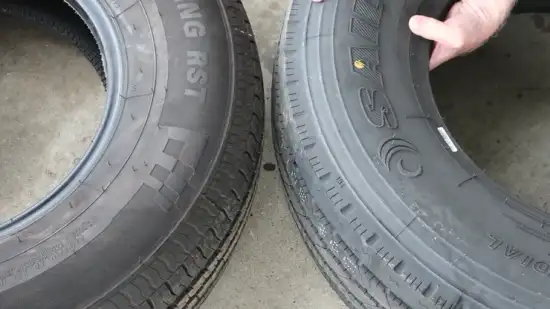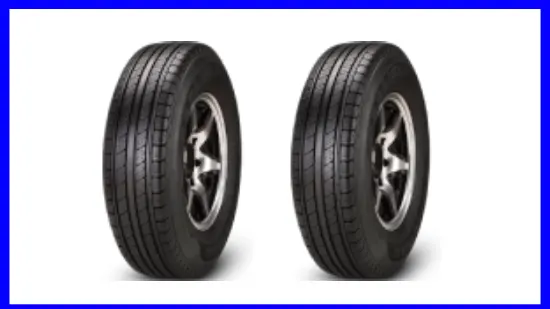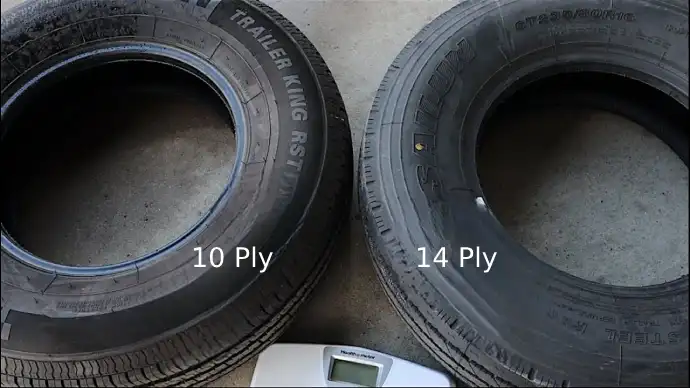Last Updated on July 16, 2023
The strength of your tires can make or break your trip, and that’s why it’s crucial to understand the differences between 10 ply and 14 ply trailer tires.
14 ply tires have a higher load rating and can handle more weight than their 10 ply counterparts. Even so, that doesn’t necessarily mean that 10 ply tires are not a good option for your RV trailer. The weight of your trailer and the conditions in which you’ll be traveling may make 10 ply tires ideal for your needs.
Here, we’ll dive into the differences between 10 and 14 ply trailer tires and how to determine the right ply rating for your RV trailer.
The Differences Between 10 Ply vs 14 Ply Trailer Tires

Understanding the differences between 10 ply and 14 ply trailer tires will make your decision much easier. Each tire’s load-carrying capacity, weight handling, durability, traction and stability, and comfort can vary greatly.
Here is a look at the differences between 10 and 14 ply trailer tires:
- No 01: Load-Carrying Capacity
- No 02: Weight Handling
- No 03: Durability
- No 04: Traction and Stability
- No 05: Comfort
- No 06: Tread Life
- No 07: Driving Conditions
- No 08: Cost
No 01: Load-Carrying Capacity
If you need to haul heavy loads during long trips, consider using 14-ply trailer tires. These tires have a load capacity of over 4,000 lbs, which is higher than the load capacity of 10-ply tires that can carry up to 3,520 lbs.
With 14-ply tires, you can enjoy worry-free travel as they are designed to carry heavy loads without compromising performance and safety.
No 02: Weight Handling
You can easily tow heavy loads with 14-ply tires if you frequently tow heavy loads. These tires are designed with a stronger construction and thicker sidewalls that can handle heavier weights without deforming or bulging.
This means they can support more weight per tire, reducing the risk of overloading and allowing you to carry more cargo or equipment.
Moreover, 14-ply tires are also better at distributing the weight evenly across the tire surface, which reduces the risk of uneven wear and tear. This means you can expect these tires to last longer and require less maintenance than lower-ply rating tires.
No 03: Durability
You’ll feel confident and secure on any terrain with 14-ply tires, knowing that their extra layers of rubber provide superior durability against punctures and impacts. This level of durability is ideal for trailers that will be traveling on rugged or rough terrains.
14-ply tires are designed to handle the toughest conditions without compromising their performance. In addition to their superior resistance against punctures and impacts, they’re also less prone to developing cracks or bulges due to the extra layers of rubber that make up the tire’s structure.
On the other hand, 10-ply tires may not be able to handle tough conditions, but they are a good option for lighter loads and less frequent use.
The added durability of 14-ply tires means that they’ll last longer than 10-ply tires, reducing the need for frequent replacements and saving you money in the long run.
No 04: Traction and Stability
When driving on challenging terrain, it’s important to have tires that provide superior traction and stability. 14-ply tires are designed to do just that. The additional layers in these tires can withstand the weight of heavy loads and provide increased grip on the road.
This makes them ideal for use on trailers, especially when hauling cargo or towing heavy equipment.
Moreover, 14-ply tires are also designed to have better control on the road. They have a stiffer sidewall that reduces the risk of tire sway, which can cause accidents when traveling at high speeds.
And for 10-ply tires, they are usually not ideal for rough and challenging terrain, as they may not be able to provide the necessary traction.
No 05: Comfort
Riding on 14-ply tires is like driving on a sturdy and reliable foundation, providing a sense of security and stability on rough terrain. These tires are built to handle heavy loads and rough conditions, making them the ideal choice for trailers that need to travel long distances.
The increased stiffness and toughness of 14-ply tires can result in a firmer ride quality, but this is a small price to pay for the durability and strength they offer.
Regarding comfort, 10-ply tires may provide a slightly smoother and quieter ride compared to 14-ply tires. This is because the 10-ply tires are more flexible and can absorb more shocks and vibrations, resulting in a more comfortable ride.
However, it’s important to remember that the primary purpose of trailer tires is to provide stability and durability, not necessarily comfort.
No 06: Tread Life
The durability of 14-ply tires compared to their 10-ply counterparts can significantly increase tread life. The additional layers in the tire provide better weight distribution, which reduces tread wear and tear.
This means that 14-ply tires are less likely to experience tread separation or punctures, leading to a longer lifespan for the tire.
No 07: Driving Conditions
Driving on rugged or challenging terrains can be a nerve-wracking experience, but with 14-ply tires, you can feel confident in your vehicle’s ability to handle the conditions.
These tires are designed to withstand the rigors of off-road driving, with their increased toughness and durability making them better suited for such conditions than 10-ply tires.
The extra plies make 14-ply tires less likely to puncture or suffer damage from rough terrain, giving you peace of mind when tackling steep inclines, rocky roads, or muddy tracks. Another advantage of 14-ply tires is that they provide better traction on uneven surfaces, which is especially important when driving off-road.
The added grip enables your vehicle to maintain stability and control, reducing the risk of skidding or sliding on loose gravel or wet surfaces. With 14-ply tires, you can handle a range of driving conditions, from snow-covered trails to sandy beaches, without worrying about tire performance.
Meanwhile, 10-ply tires are more suited to smoother surfaces and tend to wear out quicker than 14-ply models. They don’t offer the same level of protection against rocks and other debris, making them less suitable for off-road activities.
No 08: Cost
When you’re considering purchasing 14-ply tires, it’s important to keep in mind that they come with a higher price tag than their 10-ply counterparts due to their increased load capacity and durability.
The added strength and performance capabilities of a 14-ply tire make it an excellent investment for those who frequently haul heavy loads or travel over rough terrain. However, weighing the benefits against the added cost is important to ensure that it’s a worthwhile investment for your specific needs.
Comparison Table Between 10 Ply vs 14 Ply Trailer Tires
| Criteria | 10 Ply Trailer Tires | 14 Ply Trailer Tires |
| Load-Carrying Capacity | Lower | Higher |
| Durability | Moderate | High |
| Comfort | Slightly better | Slightly firmer |
| Longevity | Moderate | Longer |
| Weight Distribution | Adequate | Better |
| Traction and Stability | Good | Enhanced |
| Cost | Lower | Higher |
| Performance | Adequate | Enhanced |
Are 14 ply tires better than 10 ply?

If you frequently haul heavy loads, switching to 14-ply trailer tires is like upgrading from a paper cup to a stainless steel thermos. These tires are designed to handle much more weight and stress than their 10-ply counterparts and are also more durable.
They can hold up better over time, making them a great investment for anyone who relies on their trailer for work or transportation.
One of the main advantages of 14-ply tires is their increased load-carrying capacity. They can handle heavier loads without compromising performance or safety.
In fact, they are often used on commercial trailers and heavy-duty vehicles that require maximum durability and strength. While they may cost more upfront, 14-ply tires can save you money in the long run by reducing the risk of blowouts, punctures, and other tire-related issues.
Can I upgrade from 10-ply to 14-ply tires on my RV trailer?
For increased durability and load-carrying capacity, you can upgrade your RV trailer’s tires to higher-rated ones, like going from a regular coffee mug to a sturdy travel mug.
There are several important things to consider when upgrading from 10-ply to 14-ply tires. Firstly, a 14-ply tire is designed to carry heavier loads than a 10-ply tire, so upgrading can increase your trailer’s overall capacity.
Additionally, the thicker and stronger materials used to make 14-ply tires make them more resistant to punctures and wear and tear. If you frequently travel on rough or unpaved roads, upgrading to 14-ply tires can provide better performance and stability.
However, it’s important to be aware that upgrading to a higher ply-rated tire can be more expensive upfront, but the increased durability and load-carrying capacity can make it a worthwhile investment in the long run.
For the best results, we recommend consulting with a tire professional to ensure that your RV trailer’s specifications are compatible with the higher ply-rated tire and to receive recommendations on which tire would best fit your needs.
How do I determine the correct ply rating for my RV trailer tires?
The ply rating of your trailer tires is an important factor to consider when selecting the right tires. It refers to the number of rubber-coated plies used to construct the tire, which affects its strength, durability, and load-carrying capacity.
When determining the correct ply rating for your RV trailer tires, consider your trailer’s gross vehicle weight rating (GVWR) and add 20% to it. This will give you a minimum ply rating that you should look for when selecting tires.
However, it’s important to note that your trailer’s specific usage and weight distribution may require a higher ply rating for optimal safety and performance.
10 Ply or 14 Ply Trailer Tires: Which Is Right for Your RV Trailer?
The choice between 10 ply and 14 ply trailer tires ultimately comes down to your specific needs. While 14 ply tires are generally considered to be stronger and more durable, they also come with a higher price tag. On the other hand, 10 ply tires may be sufficient for your RV trailer depending on your weight and travel conditions.
It’s important to note that upgrading from 10 ply to 14 ply tires is possible, but it’s essential to ensure compatibility with your rims and clearance for larger sizes. Consult with your owner’s manual or tire dealer to determine the appropriate ply rating for your specific trailer.
Investing in a tire with an appropriate ply rating is crucial for your vehicle’s safety and longevity. Don’t overlook this critical component of your RV trailer and remember, “You get what you pay for.” So choose wisely and travel confidently, knowing your tires can handle the road ahead.



